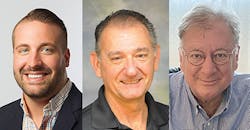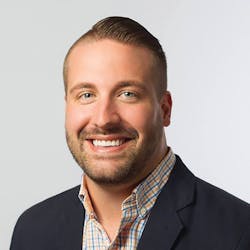Success in 2020: Operational Excellence Gets it Done
Matt Tyner, director of marketing, Williams Comfort Air, Indianapolis, Ind.
Matt Tyner’s marketing career has been uniquely focused in HVAC and plumbing service businesses, and he’s taken on each new opportunity with boundless energy and innovative thinking.
Following college, he worked for the Habbeger Corp. in southern Ohio, managing the firm’s e-commerce division, and later, territory management. His next stop was at HVAC.com, also as an e-commerce director.
He then joined Nelson Comfort in Cincinnati, Ohio, as director of sales and marketing for Nelson and Climate Control in Lexington, Ky. Today, he serves as director of marketing for Wiliams Comfort Air, Indianapolis, Ind., and its sister companies: Thomas & Galbraith, Cincinnati, Oh., Jarboe’s, Louisville, Ky., and Mr. Plumber, also in Indianapolis.
Tyner said the success all four businesses have enjoyed in a challenging 2020 has been directly related to marketing initiatives, training and community service.
Marketing + Operations
Matt Tyner believes that in any given year, a marketing plan must be totally aligned with operations, and the entire team must function together, in a way that honors the brand.
“HVAC contractors tend to emphasize ‘more leads, more leads, more leads,’ but they don't always pay attention to operations. It’s a funnel that starts out large and narrows at the bottom. If you can impact the middle and lower areas of the funnel, your overall output is going to increase,” he believes.
Recruiting is Marketing
Early in 2020, Tyner moved the recruiting activity of the four companies out of administration and human resources, and into marketing.
“Recruiting is marketing. Instead of building a client brand, you’re building an employer brand in the marketplace for potential employees,” Tyner said. “By doing this, we’ve seen lots of success in growing the team. From a marketing perspective, I’m geared toward client acquisition, and how to make sure we are there when they need us, and that we’re there first. It’s the same with finding employees, making sure you’re aware of where employees go when they’re looking to make a change, and making sure you’re building your brand and messaging so that they know what you’re all about as a company, and what you stand for. It helps to make their job choice decision a whole lot easier.”
Since ongoing training is essential to the success of any contracting business, during the pandemic, the four companies combined virtual training with hands-on learning.
“With everything that happened due to COVID -19, we wanted to conduct training responsibly, with gloves and masks, doing everything possible to keep everyone safe. We’re interacting with team members as if we’re interacting with customers,” Tyner said.
At this time, Williams Comfort Air, Mr. Plumber, Jarboe’s and Thomas & Galbreath are staying close to their established identities and not venturing into expanding into new service offerings. Tyner said in part that’s because they want to see their combined 420 employees become amazingly proficient in offering and marketing their basic HVAC and plumbing services.
“We have so much to improve internally, so now is not the right time to add any services to the mix. We’re focused on becoming better at what we do, every day. That’s helped help us grow, and will really pay off in 2021, going into 2022,” Tyner added. He also said their duct cleaning and duct sealing activity increased this year due to stay-at-home customers’ concerns over cleaner air.
Tyner offered three keys to effective marketing based on his experience in 2020:
Always know where your clients are going, always monitor your marketing, and measure your return on ad spend, or return on marketing spend or return on investment.
Always test new media platforms and advertising programs. Even in the middle of a pandemic, because people still need your services. Go find them.
Always give back. “That's a big part of who we are, and why we've been able to grow our brands within our markets: our community involvement and our giving back, specifically during the time of COVID-19. When you're able to give back to your community, the impact it has on the people you are giving back to is huge. People within the community recognize that and will respect that and choose you for their heating cooling needs. It’s a sticky moment in their mind, a memory that’s going to stick with them longer than anything you can do from a business perspective.”
Adjust your advertising to match consumer habits. During the pandemic, Tyner knew people were driving less, so he reduced his radio ad budget. With schools and day care centers closed, he adjusted his TV advertising, to appear during children’s daytime programming, when parents who had to work from home could hear it in the background, and a bit later during evening hours, because those people working from home wanted to go spend more time outdoors at the end of the work day.
Smart Ad Strategy
During the first two months of the pandemic, Tyner ran a series of messages thanking first responders, medical workers and others who were working long hours to make sure people were safe.
“We were not looking for a ‘pay off,’ but we knew it was going to create long-lasting memories with people and help to grow our top-of-mind awareness. We also noticed our competitors had reduced their marketing presence, so that was the perfect time to jump in and spend more on our marketing, because your cost per lead and cost per acquisition are dramatically lower. The cost per click is lower from Google or any of the platforms. It’s a good time to jump in to try to expand your digital product offering, when there are less people doing just that.”
__________________________________________________________
Mike Zeppi, Anthony’s Cooling, Heating, Electrical, Palmetto, Fla.
We spoke with Mike Zeppi a short time after he was visited by an American Standard video team, for a video shoot related to the company being named a winner of American Standard’s “Building a Better Standard” award for 2020. American Standard selects four winners each year, based on a high level of integrity, community stewardship, dedicated teamwork, and a focus on continuous improvement in the pursuit of excellence.
American Standard selected Anthony’s for the award in part due to its focus on teamwork and fairness, the investment it makes in employees, and its efforts to train the next generation of HVAC technicians. That training includes an apprenticeship and lots of hands-on instruction.
“The importance of proper training was impressed upon me in the military, where I was a training manager. I’ve tried to copy that ‘Management by Objectives’ method, and task-oriented training. We break jobs down into bite-sized tasks. We’ve also developed a curriculum for our “Cool School,” which I started about four years ago. It’s in- house training, because people would contact us wanting to get into the trades. We’ve combined field and classroom and also a laboratory setting, where we can experiment and break things. It’s easier to critique and educate someone when you’re not embarrassing them in front of customers,” he said.
Zeppi obtained much of his own initial HVAC knowledge while riding “shotgun” with his father for six months, way back when.
“Much of what I learned by riding with my dad involved which tools to use. What’s ironic is when I first started with him, I had a college degree, I spoke four languages, and I thought I was worth a six-figure income. I came to realize I didn’t know anything about what he did. The first book he gave me was on basic electricity, because, he said, without electricity there’s no air conditioning. From there I obtained my EPA license, and learned about ductwork and duct sealing from Florida Power and Light.”
Mike’s classrooms much of the time were in people’s attics, working on ductwork. “That really helped me understand that without good ductwork you didn’t have a good AC system,” he recalled.
“The next thing we learned was that every house was different, with different heat gain, and the importance of load calculations. We found that the systems installed in many homes were too large, and would replace a five-ton system with a three-ton. And today, we try to do everything based on facts, math and science. If we can stick to those pieces of what we do we will do the right thing and it will make sense.”
Without hesitation, Zeppi credits his team of about 38 people for the company’s success in 2020.
“It’s taken us years to get to this level of quality people,” he said. “I’ve interviewed thousands, hired hundreds, and right now I have a cadre of people who truly care about our customers. The drama is limited and the care to complete the job is high. I have six or seven military veterans who work for us, too. That’s always nice to have because they add a level of decency, camaraderie and professionalism. Their total tech workforce is at 23.
The operations team is perhaps over-staffed, but Zeppi wants customers to speak to a live person, and technicians to have good guidance from the in-house team.
“The people in our office do a great job of fielding questions and getting the right technician to the right place,” Zeppi said.
The business was growing greatly in the first quarter of 2020, and then COVID hit. Business fell from April to June, but by end of summer, year-over-year revenue was up 10 percent. There’s been a drop in people spending money, just by virtue of them not being back to work. And, we have a very tourist and service focused marketplace. Tourism fell off this summer but it’s coming back. September and October have seen an increase in tourism. I think we’ll finish the year 20 percent over 2019.”
Referrals are a major element in the success of any service business, but so are loyal, repeat customers, and Anthony’s has many of those.
“Much of our sales and installations are a result of the loyalty and trust we’ve built over the years,” Zeppi said. “I have some customers for whom we’ve changed out three systems over the years. If there’s a problem or a mistake, we own it. We don’t point fingers, and we go to great lengths to make our customers happy, whether it’s taking out a system we installed a month ago and replacing it, or replacing a duct system we installed a month ago.”
There is never pressure to replace. “Our slogan is, ‘You Don’t Need New Until We Say You Do.’ We’ve always believed we can get them more time, and we believe in options for repairs. I like customers to be able to make decisions that are not under duress,” Zeppi said.
In addition to American Standard, which accounts for 80 percent of its installation business, Anthony’s other brands include Comfortmaker, Goodman, Ruud, Bard, Mitsubishi, Fujitsu and LG.
Among Mike’s stellar assistants are Kim Philips, office manager; Stephanie Beadles, maintenance supervisor; and Oscar Sanchez, installation supervisor.
Six of the company’s technicians are certified by North American Technician Excellence (NATE). Zeppi is also a member of Service Roundtable.
_________________________________________________
Steve Saunders, CEO, Tempo Partners, Dallas, Tex.
Steve Saunders, chief executive officer for Dallas, Tex.-based Tempo Partners – the holding company for employee-owned Tempo Mechanical, TexEnergy Solutions and US EcoLogic – was recalling a peer group conversation he had a few short years ago, related to communications technology.
A question was posed as to where the group believed contractors would be on a scale from 1 to 10, in regard to technology in the coming five years. Saunders surprised the group when he said they would be at 1 or 10, with no in-between. He explained by saying those contractors who invested in technology over the coming four to five years would be glad they did; and those who hadn’t invested in their technology infrastructures would be unhappy that they didn’t.
Tempo Partners employees are not only invested financially through an Employee Stock Ownership Plan, they’re fully committed emotionally, and give everything they can to ensure the company is a success, that all employees are cared for, and all systems are “go” for servicing customers.
“During this pandemic, people showed up, they stood up, they took care of things, they managed things, as if they were in the building on Monday morning,” Saunders said.
As he observed how things progressed from his own home office, Saunders said it was gratifying, fun, scary, and basically a wonderful thing to see. It validated for him the company’s belief in helping each other to succeed, and succeeding together.
Updated Technology Platforms Well before the pandemic, Tempo Partners had made some major additions to its field and office technology capabilities.
First on the list was a switch to the ServiceTitan scheduling platform, which helped to improve communications across all channels.
“We also shifted to an internet accounting platform called Entac, which proved to be a challenging transition from the software we utilized for the previous 20 years. It took more than two years to fully integrate the systems, but our ability to track our financial performance against operational goals is tremendously valuable, and includes job costing, scheduling and inventory."
Another field data time saver and productivity booster is ProntoForms, which provides forms for dispatching, automated calculations, maps, signatures, and jobsite photos and sketches. The program collects data quickly and accurately, improves field worker productivity and submits field data to office staff in real time, for greater manager visibility and faster, automated reporting tools.
The fourth technology addition was QuickBase, a low-code field data collection platform for safe, secure and sustainable application development, helps the Tempo teams gather project information faster, achieve higher levels of productivity and gain greater insight into overall team performance.
Tempo Partners has had no layoffs during the pandemic. There was a slow down for about a month, and then work picked up speed once again.
“And this year, it's been pretty surprising, because we are substantially ahead in two divisions in terms of year-over-year revenue, and we’re reasonably ahead in two others.
“All four operating divisions are up in terms of revenue and margin percentage, which mostly means we've done a good job of managing our expenses. Much to my surprise and, and quite a bit to my pleasure, 2020 will probably be the best financial year in Tempo’s history, which makes it easier to manage technology investments.”
The executive team continues to communicate with all partners. Some work from home and some prefer to come into the office. It can be stressful for some parents having child care and schools both closed, but the company has been as supportive as possible, by offering counseling, bonuses for high performance and all the technology they need to work from home. The weekly newsletter is now sent out daily, and they use Microsoft teams
"We took a lot of time making certain that all our partners had personal protective equipment. We made sure everybody had hand sanitizer. When we started thinking about coming back to the office, we had people on staff whose job is to wipe down and clean up the office facilities and in the conference room. That’s now cleaned twice a day depending on the usage patterns," he said.
Extra effort is made to communicate with all employees.
“When we don’t see people very much, we have to communicate harder,” Saunders said. “I think we’ve done a better job this year of reaching out through all levels of the organization. I’m hopeful we can keep that up even when we’re not in the middle of a medical health crisis. It will be an interesting challenge for the future.”
About the Author
Terry McIver
Content Director - CB
As director of content for Contracting Business, he produces daily content and feature articles for CB's 38,000 print subscribers and many more Internet visitors. He has written hundreds, if not two or three, pieces of news, features and contractor profile articles for CB's audience of quality HVACR contractors. He can also be found covering HVACR industry events or visiting with manufacturers and contractors. He also has significant experience in trade show planning.



